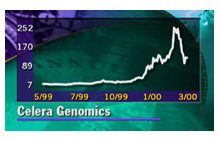|
Betting on the genetic code
|
 |
March 27, 2000: 3:58 p.m. ET
After the human genome is mapped, what then for the biotech industry?
By Staff Writer Martha Slud
|
BOSTON (CNNfn) - It wasn't too long ago that most scientists thought that unraveling the human genome - the road map to mankind's entire genetic makeup - was a milestone years away from completion. Now, this medical breakthrough appears to be months, not years, away, leaving scientists and investors alike wondering: "What's next?"
Stocks in companies involved in genomics, the study of the structure and function of genes, have rocketed in recent months amid rapid progress in charting the human genome and excitement over the biotech sector as a whole. Genomics stocks have been likened to Internet shares, both because of the upstart biotech companies' reliance on high-tech supercomputers to crunch data and the market volatility of the sector.
But investors pouring huge sums into genomics companies are largely funding a promise of a health care revolution yet to come. Once the genetic sequence is charted, companies such as Celera Genomics, Human Genome Sciences Inc. and Millennium Pharmaceuticals Inc. will have to turn their attention to what to make of this deluge of raw genetic data, and how to profit from it.
For many companies, the industry already has moved into the next phase - "post-genomics."
 The issue of charting the human genome "is no longer a debate. It's no longer a controversy. It's what we do next," Peter Barrett, chief business officer at Celera Genomics (CRA: Research, Estimates), told participants Monday at BIO 2000, an international meeting of more than 8,000 biotechnology executives and scientists in Boston. The issue of charting the human genome "is no longer a debate. It's no longer a controversy. It's what we do next," Peter Barrett, chief business officer at Celera Genomics (CRA: Research, Estimates), told participants Monday at BIO 2000, an international meeting of more than 8,000 biotechnology executives and scientists in Boston.
CNNfn Video: What is genomics?
"Biology is far more complex than our human genome," he said.
Researchers at Rockville, Md.-based Celera, which was spun off 18 months ago by scientific equipment maker PE Corp., have vowed to be the first to complete the human genome sequence, beating the Human Genome Project, an international consortium with billions of dollars in public funding.
Scientists hope that once the human genome is decoded, they will better understand the molecular basis of disease and be able to develop more effective medicines that are targeted to a patient's individual genetic makeup.
Celera does not intend to make drugs itself, but plans to help drug makers interpret the genetic data. Already, the company's database has the equivalent of about five times as much information as the entire collection in the Library of Congress in Washington, Barrett said. Celera and other genomics firms have entered licensing deals for their data with big pharmaceutical companies and also are beginning to target academic researchers.
Convinced that the company is poised for a windfall, investors have poured huge sums into Celera stock, which has soared from a little over $7 per share a year ago to as high as $276 earlier this year. The volatile stock slipped 6-3/8 to 116-1/8 in afternoon trading Monday.
 Human Genome Sciences (HGSI: Research, Estimates) CEO William Haseltine said that once the genome is mapped, drug developers will be able to turn their attention to a daunting task: creating medicines for hundred of genetic diseases that currently receive scant attention from researchers. Human Genome Sciences (HGSI: Research, Estimates) CEO William Haseltine said that once the genome is mapped, drug developers will be able to turn their attention to a daunting task: creating medicines for hundred of genetic diseases that currently receive scant attention from researchers.
By developing genes, proteins and antibodies as the basis for medicine, "some of us have the opportunity to be the new Mercks, the new Pfizers," he said, in a reference to two pharmaceutical giants. "We can direct our efforts to the greatest unmet human needs."
Citing the withdrawal for safety reasons last week of two major pharmaceutical products - Warner-Lambert Co.'s (WLA: Research, Estimates) diabetes treatment Rezulin, and Propulsid, a heartburn drug made by Johnson & Johnson (JNJ: Research, Estimates) -- Haseltine said the drug industry is struggling with dwindling pipelines and a crisis of productivity. The biotech industry, he said, can bring more customized drugs to market.
"The big pharmaceutical companies are merging so as not to submerge," he said. "There is a great opportunity to increase productivity."
Genomics companies also hope to find a market by eventually providing patients with information about their own genetic profiles - data that could be available to people on customized computer chips. It's a development expected to be patient driven - not physician driven - and will herald a new era of customized medicine, said Mark Levin, CEO of Millennium Pharmaceuticals (MLNM: Research, Estimates).
The BIO 2000 conference continues through Thursday. The opening of the gathering on Sunday attracted several thousand protesters demonstrating against genetically modified crops, one of the topics at the conference. Critics of bio-engineered food say there may be health hazards associated with the crops and companies should label products containing modified ingredients.
Some activists also are protesting genomics research and attempts by companies to patent their findings.
A few activists protested again Monday, and one threw soybeans outside the meeting hall entrance, but police said the demonstrations were mostly peaceful. 
|
|
|
|
|
 |

|

